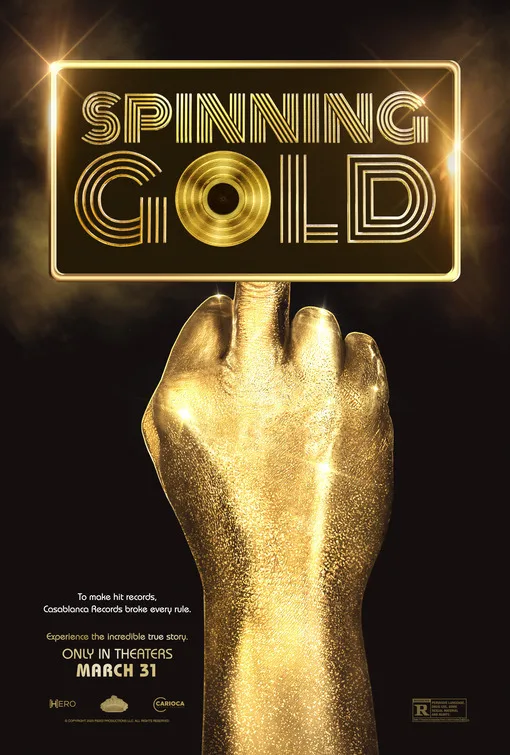The problem with “Spinning Gold” is not that it’s a bad movie so much as a boring one about a true story. For anyone with even a vague knowledge of its subject—the meteoric rise and jaw-dropping fall of Casablanca Records and founder Neil Bogart during the 1970s—the idea that a tale dealing with such levels of creative, financial, and personal excess here could be dull seems almost impossible. But “Spinning Gold” somehow manages to pull off that dubious task, audaciously crossing “The Greatest Showman” and “The Wolf of Wall Street” and ending up with a dramatically inert and historically dubious mess. It’s “Gotti” with a slightly better soundtrack.
The key issue, in this case, can be traced to the credits. The film was written and directed by Timothy Scott Bogart, son of Neil Bogart, and he is also one of the four Bogarts listed among the 29 credited producers, to say nothing of the additional ones who turn up in various positions in the end credits. (“Play It Again, Sam” didn’t have this many Bogarts in it.) Perhaps inevitably, the resulting film is basically a testimonial to the old man who may have done a couple of sketchy things here and there but who was basically a good egg who loved his family, cared about his loyal co-workers, and who was, of course, passionate about the music. As a result, many of the more questionable aspects of his life and work have been smoothed over or eliminated along the way, particularly how he rode Casablanca to astonishing heights in the late 1970s before crashing it with such force that one of the six major international record companies nearly dissolved as a result.
Instead, we are treated to a rags-to-riches saga about how Bogart (Jeremy Jordan), spurred on by his love of music and his willingness to always bet on himself, formed Casablanca Records. After a few character-building hiccups (such as releasing an album of audio clips from The Tonight Show in the mistaken belief that a record with Johnny Carson’s name on it would be an instant smash), he finally becomes a success due to such discoveries as KISS, Donna Summer, and The Village People and a flair for merchandising and promotion that was unheard of in those days. Sure, the road isn’t that smooth for Bogart—he leaves his loyal first wife Beth (Michelle Monaghan) for KISS co-manager Joyce Biawitz (Lyndsy Fonseca), which leaves him reluctant to release the group’s sure-fire ballad “Beth” as a single on the belief that it is a dig at his personal issues. Later on, Bogart gets lured into drugs via George Clinton (Wiz Khalifa), but it all pays off at the end when Bogart is able to sell half-interest in the company to PolyGram in 1977 for a huge profit.
That is pretty much the climax of the film, but, as those who know the actual story know, there was a lot more that occurred up to Bogart’s official departure from the label in 1980. Like many other record labels at the time, Bogart bet heavily on the popularity of disco music, a format that didn’t feature too many acts with lasting shelf value and would see its bottom fall out within a couple of years. There was more success with KISS, but even there, the sheer hubris on display led to insane moves, most notably the decision to have each member record a solo album to be released on the same day, a “triumph” of marketing that yielded total sales on the level that a single and presumably cheaper band album would have accomplished. Before long, the label was losing millions of Polygram’s money before they finally bought Bogart out and gave him the heave-ho. With the passage of time, it would become apparent that Bogart was less an anomaly than simply ahead of the curve, and his tendency to overspend on easily promotable trends (than taking the time to nurture longer-lasting acts) was a harbinger of things to come.
I cannot fault Bogart and Co. for wanting to put a happy (if occasionally coke-dusted) face on the old man’s story. But in taking that approach, they have eliminated or smoothed down much of what makes that story so fascinating in the first place. Instead, “Spinning Gold” is little more than a list of moments of Bogart interacting with famous names in scenes that almost certainly never happened, such as the bit where Bogart sits at the piano to rewrite and teach “Midnight Train to Georgia” to Gladys Knight (Ledisi), or which I pray never happened, such as the one where he delivers a heart-to-heart talk to Gene Simmons (Casey Likes) after a bad show. We even get to see him slip into the recording booth to give Summer (Tayla Parx) a certain degree of encouragement while she is cutting the orgasmic moans of “Love to Love You Baby.” Sure, he leaves his first wife and does get hooked on cocaine, but the film handles both so blithely they hardly seem to register.
Even if you’re somehow able to put all notions of authenticity to the side (something the film admittedly encourages from the get-go), “Spinning Gold” comes across more like a misfired jukebox musical than anything else. As Bogart, Jordan is clean and well-scrubbed, even in his down periods, and never for one moment convinces you that he has the kind of sheer moxie (for lack of a better term) the real Bogart must have possessed. The actors supporting him have even less to work with and seem to be doing little more than playing dress-up. In many cases, the classic songs have been re-recorded by the actors playing them (Jason Derulo also turns up as Ronald Isley), and while they are okay, none hold a candle to the originals.
Coming across as little more than a filmed adaptation of the first two-thirds of Neil Bogart’s Wikipedia page, “Spinning Gold” is a mess that even those with a keen interest in the subject will find both ponderous and uninformative. And yet, I’m still convinced a full cinematic accounting of the rise and fall of Bogart (who passed away in 1982) and his lasting impact on the music industry, for good and ill, could make for an absolutely compelling film—if not as a narrative feature, then as a documentary. All it would take is a willingness to approach the whole story in a straightforward manner that told everything, warts and all, and an apparent determination to keep as few members of the Bogart family involved as possible.
Now playing in theaters.




















